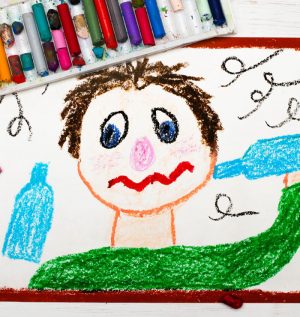It’s never too late to make a positive difference.
Addiction affects not just the person with the substance abuse problem, but those around them, as well. It can take a toll on professional and personal relationships, and those closest to the addict can experience the brunt of that addiction. And who closer to addicted parents than their own children?
Sadly, an average of 8.7 million children aged 17 or younger live in households in the United States with at least one parent who has a substance abuse disorder. SAMHSA released the full report, but some key takeaways include:
● An annual average of 1.5 million children aged 0 to 2 have a parent that struggles with addiction
● Another 1.4 million children aged 3 to 5 have at least one addicted parent
● About 7.5 million children aged 17 or younger lived in households with at least one parent who had an alcohol use disorder
These are just a few of the stats pulled from the report, but they’re staggering. But how does a parent’s addiction affect these millions of children?
Children living with addicted parents are more likely to lack the physical psychological, or emotional care they need, are more likely to be emotionally or physically abused, are more likely to become addicted themselves, may be worse at communicating to the family and others, and they may have developmental or educational delays.
Children Lack the Care They Need
The most apparent effect on a child whose parents are addicted is that they may lack the basic necessities that children need. Both drugs and alcohol impair our cognitive thought processes, meaning that everyday tasks, such as doing the laundry, cooking dinner, and having conversations with our children, may become difficult or impossible. Raising a child takes patience, understanding, and discipline – all qualities that are often lost when one is addicted to drugs or alcohol.
If you suspect that a child in your life is living in a household with addicted parents, here are some signs to look out for:
● The child comes to school or activities in dirty clothes
● The child doesn’t have lunch or comes to school hungry because they didn’t have dinner the night before
● The child makes excuses for their behavior or appearance
● The child doesn’t seem to fit in with the other kids at school or in activities
● The child is always tardy or absent
These are all signs that may indicate that a child is living with at least one parent struggling with addiction. If that’s the case, contact the SAMHSA National Helpline.
Children are More Likely to Be Abused
Unfortunately, children whose parents struggle with addiction are more likely to be emotionally or physically abused, according to Psychology Today and the study “Families Affected by Parental Substance Use. The study states that “children whose parents use drugs and misuse alcohol are three times more likely to be physically, sexually, or emotionally abused and four times more likely to be neglected than their peers.”
This is a call to action to all educators, pediatricians, coaches, and counselors that if you see, something, say something. If we notice any signs of abuse, it is both our ethical and legal right to report these findings. You can help stop parental addiction and the subsequent child abuse by speaking up.
Children are More Likely to Become Addicted Themselves
Children look up to their parents for everything and it can be surprising how much they actually listen and take note. That is the same with when a parent uses drugs or alcohol. A child can see this behavior, normalize it, and do it themselves. Addiction is not always genetic, but it can be behavioral and if a child is exposed to drugs or alcohol at a young age, they may turn to it as they get older.
Children May Be Worse at Communication
Spending time with family, including parents and siblings, teaches kids how to communicate in the real world. If they say something mean to their sister, they are reprimanded so they learn not to say mean things to other children. This communication is crucial to our social developments. But with children whose parents are addicted to drugs or alcohol, this communication channel might be lost. In addition, older children whose parents are addicts may not open up to their parents about their own issues as other children might. This is when you tell yourself that you need help. If you are on the journey of getting clean for yourself and your family, treatment and family therapy can help you discuss your hang-ups and asks those around you for help. This professional space opens up important lines of
communication for both children and parents and can help a family struggling with addiction find hope.
Developmental or Educational Delays
Lastly, children who live with parents who struggle with addiction may face developmental and/or educational delays. This is because parents with substance abuse disorders are less available for their children’s growth. They might not be around to read with them, practice math problems, and help them with their homework. In addition, children of parental substance abuse may exhibit behavioral disorders, such as ADHD or depression, more than other children. It’s clear that addiction not only affects the individual, but it also impacts their children, as well.
If you or someone you love is struggling with addiction, get help not only for yourself, but for your children as well. There are many anonymous ways to get the help you need and together, you can work through both individual and family therapy. Visit American SPCC’s help and support resources by clicking here.
 Trevor McDonald is a freelance content writer who has a passion for writing and is currently working for JourneyPure Bowling Green. He’s written a variety of education, travel, health, family, and lifestyle articles for many different companies. He is inspired by Positive Parenting and American SPCC’s mission to help children reach their infinite potential. As a father himself, he is adamant about ensuring children’s safety, health, and happiness. In his free time, you can find him running with his dog, playing with his son, playing his guitar, or outside enjoying about any type of fitness activity imaginable.
Trevor McDonald is a freelance content writer who has a passion for writing and is currently working for JourneyPure Bowling Green. He’s written a variety of education, travel, health, family, and lifestyle articles for many different companies. He is inspired by Positive Parenting and American SPCC’s mission to help children reach their infinite potential. As a father himself, he is adamant about ensuring children’s safety, health, and happiness. In his free time, you can find him running with his dog, playing with his son, playing his guitar, or outside enjoying about any type of fitness activity imaginable.

